安徽省淮南二中2016-2017学年高一12月月考英语试题(平行班) Word版含答案
- 格式:doc
- 大小:177.50 KB
- 文档页数:14
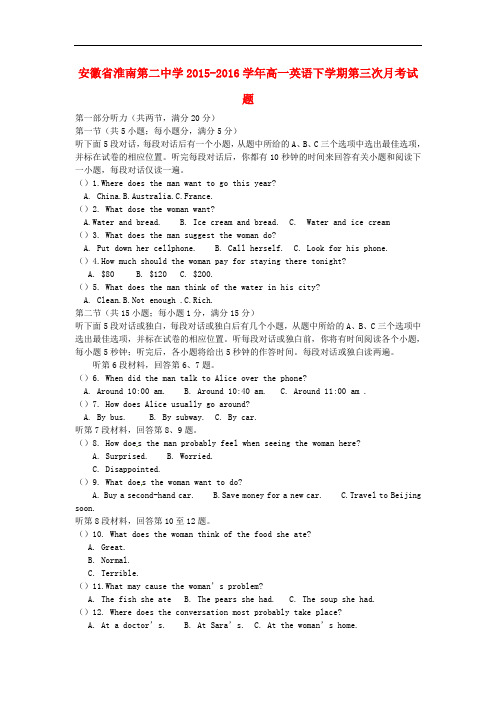
安徽省淮南第二中学2015-2016学年高一英语下学期第三次月考试题第一部分听力(共两节,满分20分)第一节(共5小题;每小题分,满分5分)听下面5段对话,每段对话后有一个小题,从题中所给的A、B、C三个选项中选出最佳选项,并标在试卷的相应位置。
听完每段对话后,你都有10秒钟的时间来回答有关小题和阅读下一小题,每段对话仅读一遍。
()1.Where does the man want to go this year?A. China.B.Australia.C.France.()2. What dose the woman want?A.Water and bread.B. Ice cream and bread.C. Water and ice cream()3. What does the man suggest the woman do?A. Put down her cellphone.B. Call herself.C. Look for his phone.()4.How much should the woman pay for staying there tonight?A. $80B. $120C. $200.()5. What does the man think of the water in his city?A. Clean.B.Not enough .C.Rich.第二节(共15小题;每小题1分,满分15分)听下面5段对话或独白,每段对话或独白后有几个小题,从题中所给的A、B、C三个选项中选出最佳选项,并标在试卷的相应位置。
听每段对话或独白前,你将有时间阅读各个小题,每小题5秒钟;听完后,各小题将给出5秒钟的作答时间。
每段对话或独白读两遍。
听第6段材料,回答第6、7题。
()6. When did the man talk to Alice over the phone?A. Around 10:00 am.B. Around 10:40 am.C. Around 11:00 am .()7. How does Alice usually go around?A. By bus.B. By subway.C. By car.听第7段材料,回答第8、9题。
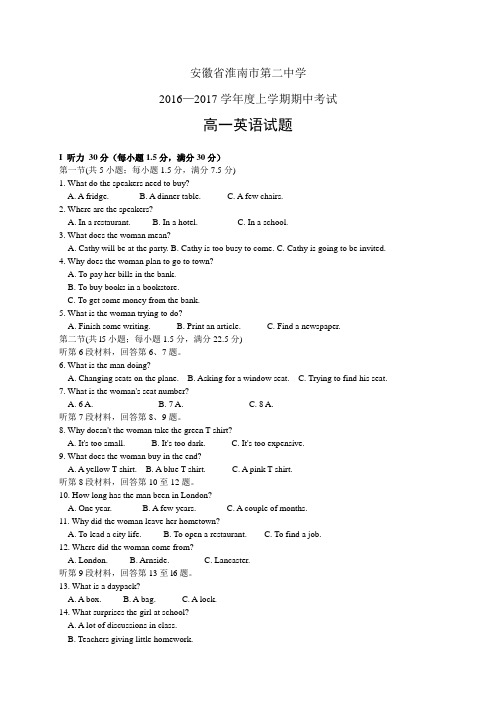
安徽省淮南市第二中学2016—2017学年度上学期期中考试高一英语试题I 听力30分(每小题1.5分,满分30分)第一节(共5小题;每小题1.5分,满分7.5分)1. What do the speakers need to buy?A. A fridge.B. A dinner table.C. A few chairs.2. Where are the speakers?A. In a restaurant.B. In a hotel.C. In a school.3. What does the woman mean?A. Cathy will be at the party.B. Cathy is too busy to come.C. Cathy is going to be invited.4. Why does the woman plan to go to town?A. To pay her bills in the bank.B. To buy books in a bookstore.C. To get some money from the bank.5. What is the woman trying to do?A. Finish some writing.B. Print an article.C. Find a newspaper.第二节(共l5小题;每小题1.5分,满分22.5分)听第6段材料,回答第6、7题。
6. What is the man doing?A. Changing seats on the plane.B. Asking for a window seat.C. Trying to find his seat.7. What is the woman's seat number?A. 6 A.B. 7 A.C. 8 A.听第7段材料,回答第8、9题。
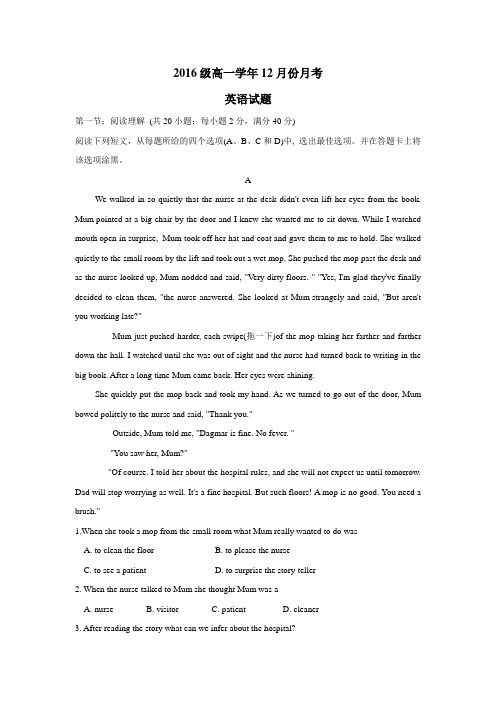
2016级高一学年12月份月考英语试题第一节:阅读理解(共20小题;每小题2分,满分40分)阅读下列短文,从每题所给的四个选项(A、B、C和D)中, 选出最佳选项。
并在答题卡上将该选项涂黑。
AWe walked in so quietly that the nurse at the desk didn't even lift her eyes from the book. Mum pointed at a big chair by the door and I knew she wanted me to sit down. While I watched mouth open in surprise, Mum took off her hat and coat and gave them to me to hold. She walked quietly to the small room by the lift and took out a wet mop. She pushed the mop past the desk and as the nurse looked up, Mum nodded and said, "Very dirty floors. " "Yes, I'm glad they've finally decided to clean them, "the nurse answered. She looked at Mum strangely and said, "But aren't you working late?"Mum just pushed harder, each swipe(拖一下)of the mop taking her farther and farther down the hall. I watched until she was out of sight and the nurse had turned back to writing in the big book. After a long time Mum came back. Her eyes were shining.She quickly put the mop back and took my hand. As we turned to go out of the door, Mum bowed politely to the nurse and said, "Thank you."Outside, Mum told me, "Dagmar is fine. No fever. ""You saw her, Mum?""Of course. I told her about the hospital rules, and she will not expect us until tomorrow. Dad will stop worrying as well. It's a fine hospital. But such floors! A mop is no good. You need a brush."1.When she took a mop from the small room what Mum really wanted to do was _____A. to clean the floorB. to please the nurseC. to see a patientD. to surprise the story-teller2. When the nurse talked to Mum she thought Mum was a________A. nurseB. visitorC. patientD. cleaner3. After reading the story what can we infer about the hospital?A. It is a children's hospital.B. It has strict rules about visiting hours.C. The conditions there aren't very good.D. The nurses and doctors there don't work hard.4. Which of the following words best describes Mum?A. strangeB. warm-heartedC. cleverD. hard-workingBAmericans use many expressions with the word dog. People in the United States love their dogs and treat them well. They take their dogs for walks, let them play outside and give them good food and medical care. However, dogs without owners to care for them lead a different kind of life. The expression, to lead a dog's life, describes a person who has an unhappy life.Some people say we live in a dog-eat-dog world. That means many people are competing for the same things, like good jobs. They say that to be successful, a person has to work like a dog. This means they have to work very, very hard. Such hard work can make people dog-tired. And, the situation would be even worse if they became sick as a dog.Still, people say every dog has its day. This means that every person enjoys a successful period during his or her life. To be successful, people often have to learn new skills. Yet, some people say that you can never teach an old dog new tricks. They believe that older people do not like to learn new things and will not change the way they do things.Some people are compared to dogs in bad ways. People who are unkind or uncaring can be described as meaner than a junkyard dog. Junkyard dogs live in places where people throw away things they do not want. But mean dogs are often used to guard this property. They bark or attack people who try to enter the property. However, sometimes a person who appears to be mean and threatening is really not so bad. We say his bark is worse than his bite.Dog expressions also are used to describe the weather. The dog days of summer are the hottest days of the year. A rainstorm may cool the weather. But we do not want it to rain too hard. We do not want it to rain cats and dogs.5. A person who lives an unhappy life can be described as “_______”.A. becoming sick as a dogB. leading a dog’s lifeC. living in a dog-eat-dog worldD. Working like a dog6. The underlined word “mean” in Paragraph 4 most probably means “_______”.A. violentB. selfishC. wildD. poor7. What can we learn from the text?A. Everyone can be successful if he learns from the old.B. It might be difficult for the young to learn new skills.C. Junkyard dogs are careful in money arrangement.D. Fierce persons aren’t so awful as their appearance sometimes.8. To support his idea, the author develops the text mainly by _______.A. listing reasonsB. using idiomsC. giving examplesD. Making comparisonsCHave you ever heard of an old saying Intelligence is a born ability while goodness is a choice. Gifts are easy—they’re given after all. Choice can be hard.I got the idea to start Amazon 16 years ago. I came across the fact that the Internet usage was growing at 2300 percent per year. I’d never seen or heard of anything that grew that fast, and the idea of building an online bookstore with millions of titles was very exciting to me. I had just turned 30 years old, and I’d been married for a year. I told my wife Mackenzie that I wanted to quit my job and go to do this crazy thing that probably wouldn’t work since most start-ups don’t and I wasn’t sure what to expect. Mackenzie told me I should go for it. As a young boy, I’d been a garage inventor. I’d always wanted to be an inventor,and she wanted me to follow my passion.I was working at a financial firm in New York City with a bunch of very smart people and I had a brilliant boss that I much admired. I went to my boss and told him I wanted to start a company selling books on the Internet. He took me on a long walk in Central Park,listened carefully to me, and finally said, “That sounds like a really good idea, but it would be an even better idea for someone who didn’t alread y have a good job.” That logic made some sense to me, and he convinced me to think about it for 48 hours before making a final decision. Seen in that light, it really was a difficult choice, but finally, I decided I had to give it a shot. I didn’t think I’d regret trying and failing. And I suspected I would always be haunted by a decision to not try at all.After much consideration, I took the less safe path to follow my passion, and I’m proudof that choice. For all of us, in the end, we are our choice.9. What inspired the author with the idea of building an online bookstore?A. His dream of being an inventor.B. The support of his wife.C. The greatly increasing usage of the Internet.D. Millions of exciting titles.10. Which of the following would be the best title for the passage?A. Cleverness and KindnessB. The Starting of AmazonC. Following My PassionD. We Are What We Choose11. We can know from the passage that_______.A. the boss thought the idea was suitable for the authorB. the author wanted someone else to try the ideaC. the author might not regret if he failed the ideaD. the author might go back to his boss if he failedDThe English are famous for their manners. The phrase, "Manners make the man" was coined by Englishman William of Wykeham back in 1324, but they're just as important today. Books are written on the subject; advice columns in magazines tell people how to behave; and "finishing schools" still exist to ensure that young girls become young "ladies".The best example of English manners is in their mastery of the art of forming a queue. It is a popular joke in England (the land of sporting failures) to say, "If only queuing was an Olympic sport, we'd win hands down." No one knows exactly how and when it started, but queuing plays an important role in the English social make-up. School children are taught to queue for roll-call, assembly and lunch, and English people across the land form orderly queues at shops, banks, cinemas and bus-stops every day. The English obviously aren't the only people who queue, but they seem to do it better than anyone else. As one visitor said, "I have travelled across Europe, the Middle and Far East and nowhere have I seen the single-file queues which are formed in England."The English are also famously polite when it comes to language. Whereas many other nations are more direct in their communication, the English prefer a more indirect form of asking for things. For example, an American who wants to talk to a colleague might say, "Got a minute?"; however an English person will often use a more indirect means of requesting the chat, "Sorry to bother you, but would you possibly have a minute or so to have a quick chat if you don't mind, please?"The English also love to apologize for things. When squeezing past someone, people say "Sorry". And they will apologize if you bump into them, "Whoops! Sorry! My fault." In fact, no one seems to say "Sorry" as much as the English: "Sorry I'm late. /Sorry I forgot to call you last night./I'm sorry you didn't get the e-mail." And so on. They also like to use "Please" and "Thank you" a lot. In a shop, they will say, "I'd like a packet of crisp, please. Thanks." British students thank their lectures, and bosses often thank their employees for doing their jobs.12. Why does "finishing schools" still exist to help young girls become "ladies"?A. Because the English mind their manners very much.B. Because the English parents want to marry their daughters to the royal family.C. Because the English girls are so rude that they need to be taught to be polite.D. Because the English government ensures their existence.13. The underlined sentence in paragraph2 implies ______.A. The English love the Olympics very much.B. The English spend nothing winning an Olympic medal.C. The English are best at queuing.D. The English prefer to queue with their hands down.14. According to the passage, if Americans say "Waiter! Could I have another fork, please?" howwill the English express such a meaning?A. Excuse me! Give me another fork, please!B. Excuse me! I have to be a bother, but would you mind awfully changing this fork, please?C. Hi! Would you mind giving me another fork?D. Waiter! Come here and change the fork!15. According to the passage, why do the employers often thank their employees for doing theirjobs?A. The employees can bring them a lot of benefits.B. The employees finish their jobs perfectly.C. The English employers' good manners lead them to do so.D. The employers do it as a result of the company's regulation.根据短文内容,从短文后的选项中选出能填入空白处的最佳选项。

淮南二中2019届高一年级第一次教学质量检测英语试题命题老师黄少才审题老师高一英语教研组I。
听力(共两节,满分20分)第一节(共5小题;每小题1分,满分5分)1. What does the man mean?A。
He doubts the woman will like the novel.B。
He hasn’t started reading the novel yet.C. He enjoyed reading the novel.2。
What does the woman mean?A. Her backhand is almost perfect。
B。
Her mother is a good tennis coach.C。
The time the man spent practicing has helped him。
3. What does the woman imply?A。
She doesn’t plan to work in her brother’s law f irm。
B。
She doesn't want to be a criminal lawyer。
C. She has decided not to go to a law school。
4。
Why does the man look tired?A。
He played soccer last night.B. He took a lot of pictures last night.C. He didn't sleep until midnight。
5。
What does the woman mean?A. She sold all her furniture before she moved into the new house.B。
She still keeps some old furniture in her new house.C. She bought a new set of furniture from Italy last month。
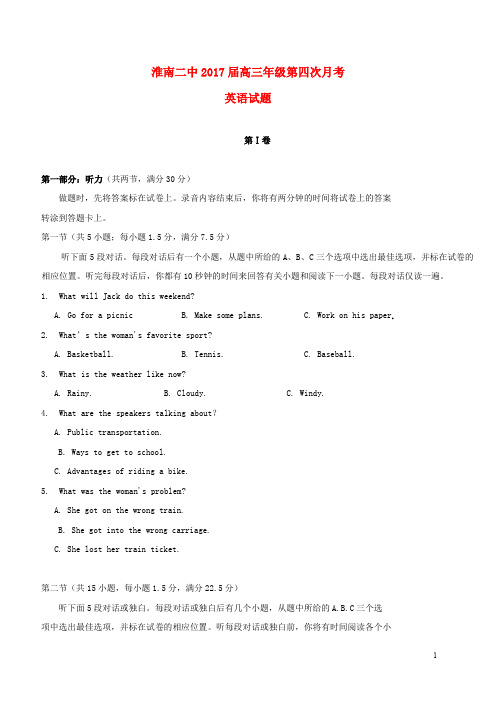
淮南二中2017届高三年级第四次月考英语试题第Ⅰ卷第一部分:听力(共两节,满分30分)做题时,先将答案标在试卷上。
录音内容结束后,你将有两分钟的时间将试卷上的答案转涂到答题卡上。
第一节(共5小题;每小题1.5分,满分7.5分)听下面5段对话。
每段对话后有一个小题,从题中所给的A、B、C三个选项中选出最佳选项,并标在试卷的相应位置。
听完每段对话后,你都有10秒钟的时间来回答有关小题和阅读下一小题。
每段对话仅读一遍。
1.What will Jack do this weekend?A. Go for a picnicB. Make some plans.C. Work on his paper.2.What’s the woman's favorite sport?A. Basketball.B. Tennis.C. Baseball.3.What is the weather like now?A. Rainy.B. Cloudy.C. Windy.4.What are the speakers talking about?A. Public transportation.B. Ways to get to school.C. Advantages of riding a bike.5.What was the woman's problem?A. She got on the wrong train.B. She got into the wrong carriage.C. She lost her train ticket.第二节(共15小题,每小题1.5分,满分22.5分)听下面5段对话或独白。
每段对话或独白后有几个小题,从题中所给的A.B.C三个选项中选出最佳选项,并标在试卷的相应位置。
听每段对话或独白前,你将有时间阅读各个小题,每小题5秒钟;听完后,各小题将给出5秒钟的作答时间。
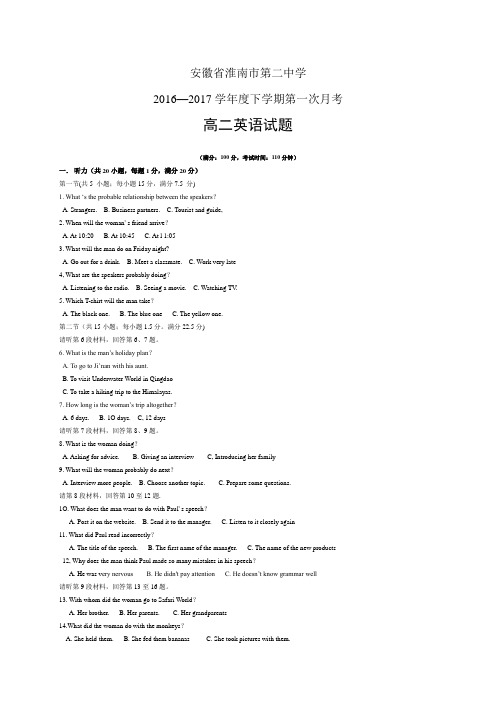
安徽省淮南市第二中学2016—2017学年度下学期第一次月考高二英语试题(满分:100分,考试时间:110分钟)一.听力(共20小题,每题1分,满分20分)第一节(共5 小题;每小题15分,满分7.5 分)1. What ‘s the probable relationship between the speakers?A. Strangers.B. Business partners.C. Tourist and guide,2. When will the woman' s friend arrive?A. At 10:20B. At 10:45C. At l 1:053. What will the man do on Friday night?A. Go out for a drink.B. Meet a classmate.C. Work very late4, What are the speakers probably doing?A. Listening to the radio.B. Seeing a movie.C. Watching TV.5. Which T-shirt will the man take?A. The black one.B. The blue oneC. The yellow one.第二节(共15小题;每小题1.5分。
满分22.5分)请听第6段材料,回答第6、7题。
6. What is the man’s holiday plan?A. To go to Ji’nan with his aunt.B. To visit Underwater World in QingdaoC. To take a hiking trip to the Himalayas.7. How long is the woman’s trip altogether?A. 6 days.B. 1O days. C, 12 days请听第7段材料,回答第8、9题。
安徽省淮南市第二中学2016-2017学年高一英语12月月考试题(平行班)(时间 80分钟满分 100分)I. 听力(共两节,满分10分)第一节(共5小题;每小题0.5分, 满分2.5分)1. Why do the two speakers want to go to a bar?A. Because they don’t want to be caught in the rain.B. Because they want to have a drink.C. Because they want to meet another friend.2. How long will the man have to wait before the plane takes off at the airport?A. 105 minutes.B. 80 minutes.C. 75 minutes.3. What is the woman going to buy?A. Pants suit.B. A blouse.C. A coat.4. What can we learn from this conversation?A. Michael is playing in the garden.B. Sally is playing in the garden.C. Sally is not present here.5. What kind of coffee does the man prefer?A. White coffee without sugar.B. Coffee with sugar.C. Coffee without milk or sugar.第二节(共15小题;每小题0.5分,满分7.5分)听第6段材料,回答第6、7题。
6. For which day did the man book a room finally?A. April 22nd.B. April 21st.C. April 23rd.7. How much will the man pay for the room?A. 100 dollars.B. 99 dollars.C. 108 dollars.听第7段材料,回答第8至10题。
2016级第三次阶段性检测英语试卷注意事项:本试题分为第Ⅰ卷和第Ⅱ卷两部分,满分150分,考试时间为120分钟。
其中第Ⅰ卷为选择题共100分;第Ⅱ卷为非选择题共50分。
第Ⅰ卷(共三部分,满100分)第一部分:听力(共两节,满分30分)第一节听下面5段对话。
每段对话后有一个小题,从题中所给的A、B、C三个选项中选出最佳选项,并标在试卷的相应位置。
听完每段对话后,你都有10秒钟的时间来回答有关小题和阅读下一小题。
每段对话仅读一遍。
1. What does the woman worry about?A. Their train tickets.B. Traffic jams.C. Driving speed.2. How will the woman go to the hospital?A. By bus.B. By taxi.C. By car.3. What is the assignment for next Tuesday?A. Read the textbook.B. Listen to radio programs.C. Write a composition.4. Where does the conversatio n take place?A. In a hotel.B. In a restaurant.C. In a store.5. What does the man think of the drums?A. Noisy.B. Wonderful.C. Annoying.第二节听下面5段对话或独白。
每段对话或独白后有几个小题,从题中所给的A、B、C三个选项中选出最佳选项,并标在试卷的相应位置。
听每段对话或独白前,你将有时间阅读各个小题,每小题5秒钟;听完后,各小题将给出5秒钟的作答时间。
每段对话或独白读两遍。
听第6段材料,回答第6-8题。
6. What is the relationship between the speakers?A. Workmates.B. Husband and wife.C. Father and daughter.7. Why did the man go to Fortaleza?A. To go on business.B. To do some shopping.C. To enjoy the scenery.8. What is Tommy doing?A. Playing on his computer.B. Watching TV.C. Talking with his friends.听第7段材料,回答第9至11题。
安徽省淮南市第二中学2016-2017学年高一英语12月月考试题(创新班)I听力第一节听下面5段对话,每段对话后有一个小题,从题中所给的A、B、C三个选项中选出最佳选项,并标在试卷的相应位置。
听完每段对话后,你都有10秒钟的时间来回答有关小题和阅读下一小题。
每段对话仅读一遍。
1. What does the woman want to do?A. Return her shoes.B. Repair her shoes.C. Buy new shoes.2. Where does the conversation take place?A. At an airport.B. At a hotel.C. At a travel agency.3. Who will probably decide the place to go?A. The man.B. The woman.C. Harry.4. What makes the man so happy?A. Tom will play football with him.B. Tom will tell him the best news.C. Tom’s father will play football with him.5. What does the woman like to watch in her spare time?A. Advertisements.B. TV plays.C. Art shows.第二节听下面5段对话或独白,每段对话或独白后有几个小题,从题中所给的A、B、C三个选项中选出最佳选项,并标在试卷的相应位置。
听每段对话或独白前,你将有时间阅读各个小题,每小题5秒钟;听完后,各小题将给出5秒钟的作答时间。
每段对话或独白读两遍。
听第6段材料,回答第6至8题。
6. Why is the woman so excited?A. Her grandpa will cook for them.B. Her grandpa will come here.C. Her grandpa will give her a valuable present.7. How does the grandpa come here?A. By plane.B. By bus.C. By train.A. The grandpa was independent.B. The grandpa will arrive at 6 o’clock in the morning.C. The speakers will book a room for the grandpa.听第7段材料,回答第9至11题。
安徽省淮南市凤台县第二中学高一英语月考试题含解析一、选择题1. The day Nelson Mandela helped me was one of my happiest.A. whichB. thatC. whenD. where参考答案:C略2. The police stopped the car______ speed was more than 120km per hour.A. whoseB. whichC. of whichD. that参考答案:A3. Beyond _______ stars, the astronauts saw nothing but _______ space.A. the; /B. /; theC. /; /D. the; the参考答案:A4. . An increase in the price of drugs has ________ the rising cost of medical care.A .turned to B. appealed to C. refer to D. contributed to参考答案:D略5. Can you tell me whom the talk tomorrow?A. to; will giveB. to; giveC. by; was givenD. by; will be given参考答案:D【详解】考查宾语从句。
句意:你知道明天的演讲是谁做的么?此处为宾语从句,whom the talk tomorrow 作tell me 的宾语,talk与give之间是被动关系,tomorrow表明为一般将来时,所以要用一般将来时的被动语态,陈述语气是the talk will be given by whom,第一个空需要用by,故D项正确。
6. Some netizens’ to the accident in Chongqing really shocked us.A. altitudeB. attitudeC. accentD. attack参考答案:B【详解】考查名词辨析。
淮南二中2019届高一年级第一学期教学质量检测英语试题(时间 80分钟满分 100分)I. 听力(共两节,满分10分)第一节(共5小题;每小题0.5分, 满分2.5分)1. Why do the two speakers want to go to a bar?A. Because they don’t want to be caught in the rain.B. Because they want to have a drink.C. Because they want to meet another friend.2. How long will the man have to wait before the plane takes off at the airport?A. 105 minutes.B. 80 minutes.C. 75 minutes.3. What is the woman going to buy?A. Pants suit.B. A blouse.C. A coat.4. What can we learn from this conversation?A. Michael is playing in the garden.B. Sally is playing in the garden.C. Sally is not present here.5. What kind of coffee does the man prefer?A. White coffee without sugar.B. Coffee with sugar.C. Coffee without milk or sugar.第二节(共15小题;每小题0.5分,满分7.5分)听第6段材料,回答第6、7题。
6. For which day did the man book a room finally?A. April 22nd.B. April 21st.C. April 23rd.7. How much will the man pay for the room?A. 100 dollars.B. 99 dollars.C. 108 dollars.听第7段材料,回答第8至10题。
8. Why doesn’t the man book the seats downstairs?A. It’s too expensive.B. It’s too crowded.C. It’s too far.9. When does the man plan to see the performance?A. Next Saturday.B. On October 21st.C. On October 25th.10. How much does each upstairs ticket cost?A. $10.B. $3.75.C. $ 2.50.听第8段材料,回答第11至13题。
11. What is the possible relationship between the two speakers?A. Teacher and student.B. Classmates.C. Saleswoman and customer.12. Where does Tom Brown work now?A. In the Spanish department.B. In the Jones at French Company.C. In the National Bank.13. Which language do you think Kathy Smith teaches now?A. German.B. Spanish.C. French.听第9段材料,回答第14至16题。
14. Where does the conversation take place?A. In a bank.B. At an airport ticket office.C. At a police station.15. Where was the woman’s money probably stolen?A. Near the bank.B. On the moving stair from the ground.C. Around the police station.16. What’s the woman doing in the city?A. Doing a business.B. Paying a visit.C. Havinglessons.听第10段材料,回答第17至20题。
17. What was children’s education like in the past?A. Children liked to sit in the classroom for hours.B. Children had to go on repeating things until they could learn them by heart.C. Children could think and learn by themselves.18. What do we learn from the passage?A. Children today like staying in school.B. Some children today hate to get out of the classroom when the teachers ask them to.C. Something should be done to encourage children to learn by themselves.19. Why can’t some of the children find jobs?A. They are too young to do so.B. Their parents won’t allow them to do so.C. The teachers won’t help them do so.20. What do many teachers consider?A. Wondering if they can make children learn.B. Wondering if children can learn by themselves.C. Wondering what they should do to help children learn.II. 阅读理解(共10小题;每小题2分,满分20分)阅读下列短文,从每题所给的四个选项(A、B、C、和D)中,选出最佳选项。
ATips for Getting the Most out of a “Photowalk”Photowalks are a great way to get out and get clicking, either by yourself, with a couple of friends, or with a group of people. They can be wonderful for seeing a neighborhood or wild space with new eyes, getting inspired to be more creative with angles and subjects, as well as simply spending time with fun people. Here area few tips for making sure you get the most out of a photowalk.Pick a spot with lots of interestA p hotowalk is a perfect excuse to go exploring a new area. However, if you’ve never been to the scene before, you might be disappointed at the final photos. Base your chosen spot on what you feel like photographing—whether that is buildings, people, busy str eets, a festival, nature and so on, and make sure the place you’re heading for is filled with what you most want to shoot(拍摄). It will pay off in a satisfying walk if you research your chosen spot beforehand and know what to expect.Invite anyone, no matter what their skill level isYou’ll be surprised at what you learn from people who seem to know nothing about photography. Even with a simple camera, they can catch some outstanding photos. So bring Aunt Betty or your 10-year-old nephew or anyone else whose company you might enjoy on a walk and keep an open mind.Don’t forget themBe sure to take the important small things, such as an extra memory card (or two), an extra fully charged battery, comfortable shoes and clothing. And remember a notepad and pen for taking down notes about places, times, conditions, the names and information of people you meet and any other information you might want to remember about certain shots(照片; 镜头).Keep an eye out for dangerApart from watching the sky for rain, you’ll wa nt to watch out for other people as well. Smartphones are always a target(目标) for thieves but they have become much clearer about the value of digital cameras. Don’t make yourself a target by standing for a very long time holding your camera out in front o f you. If you’re in an area that is really busy or you aren’t super comfortable, then just be careful about when to use your camera. Imagine your shot in your head before holding up your camera, or use a camera belt wrapped around your wrist or shoulder.21. To choose a better place for a photowalk, you are supposed to ______.A. spend time discussing with fun peopleB. decide the place on your interestC. choose famous placesD. find a new area22. The people you go photowalking with ______.A. must know the area wellB. have learned photographyC. would like to explore the places for youD. enjoy walking with you and keep an open mind23. You can hold the camera around your wrist or shoulder in case _______.A. it is stolen by a thiefB. it gets wet in the rainC. it loses some informationD. it falls down on the groundBWhen I was a boy, I used to love walking in the woods around my home. My mum warned me several times never to travel so far that I would lose sight of the house. Being a typical boy, however, I soon found myself hiking further and further away, testing just how far I could go into the woods without getting lost. After losing my way once for two hours, though, I decided that I had better leave a trail(痕迹;踪迹) the next time I went for a walk.The very next day I decided to try it. I walked into the woods until the house was out of sight. Then I broke a small branch on a young tree to mark my place. I wandered(徘徊;漫步) further in and broke another limb(大树枝) and then another. In a few spots where there were no limbs small enough, I snapped (折断) the heads off the low plants that were growing where the sunlight broke through the trees. After a while I finally got tired and decided to head back. Turning around I easily found my tracks, but instead of being proud I felt sad. I could see the trail of destruction I had left in the woods going on and on. Looking at the broken limbs and dead flowers I wondered if God was disappointed in me and I vowed(发誓) never to do that again.Instead, I started to cherish my times alone in the woods with nature. I’d sit by the streams and listen to them sing. I’d watch the birds and squirrels. I’d bend down to smell the flowers. And I even buried an acorn(橡子) or two hoping that one day an Oak might grow.There is an old Native American Saying that goes “We will be known forever by the tracks we leave.” As I have grown older and wiser, I have done my best to never leave a trail of destruction in my life as I did in the woods that day. I have instead tried to leave tracks of love, kindness, goodness, and compassion and I have tried hard to show others that they can do the same. May you always leave tracks of joy as you follow your own trail of love.24. When the boy headed back from the woods, he felt sad because ______.A. he lost his way in the woodsB. he could find his tracks so easilyC. he left many trails of destructionD. God was very disappointed in him25. What does the underlined word “cherish” in Paragraph 2 mean?A. findB. valueC. wasteD. spend26. The author wrote the passage to ______.A. call on us to leave tracks of virtues in lifeB. inform us that we shouldn't destroy treesC. tell us how to avoid getting lost in the woodsD. show us ways to get back home in the forestCImagine you’re at a party full of strangers. You’re nervous. Who are these people? How do you start a conversation? Fortunately, you’ve got a thing that sends out energy at tiny chips(芯片) in everyone’s name tag(标签). The chips send backname, job, hobbies, and the time available for meeting—whatever. Making new friends becomes simple.This hasn’t quite happened in real life. But the world is already experiencing a revolution using RFID technology.An RFID tag with a tiny chi p can be fixed in a product, under your pet’s skin, even under your own skin. Passive RFID tags have no energy source-batteries because they do not need it. The energy comes from the reader, a scanning device(扫描装置), that sends out energy (for example, radio waves) that starts up the tag immediately.Such a tag carries information specific to that object, and the data can be updated. Already, RFID technology is used for recognizing each car or truck on the road and it might appear in your passport. Doctors can put a tiny chip under the skin that will help locate and obtain a patient’s medical records. At a nightclub in Paris or in New York the same chip gets you into the VIP (very important person) section and pays for the bill with the wave of an arm.Take a step back: 10 or 12 years ago, you would have heard about the coming age of computing. One example always seemed to surface: Your refrigerator would know when you needed to buy more milk. The concept was that computer chips could be put everywhere and send information in a smart network that would make ordinary life simpler.RFID tags are a small part of this phenomenon(现象;非凡事物). “The world is going to be a loosely coupled set(松散耦合的一组)of individual small devices, connected wirelessly,” predicts Dr. J. Reich. Human right supporters are nervous about the possibilities of such technology. It goes too far tracking school kids through RFID tags, they say. We imagine a world in which a beer company could find out not only when you bought a beer but also when you drank it. And how many beers. Accompanied by how many biscuits.When Marconi invented radio, he thought it would be used for ship-to-shore communication. Not for pop music. Who knows how RFID and related technologies will be used in the future? Here’s a wild guess: Not for buying milk.27. The article is intended to ______.A. warn people of the possible risks in using RFID technologyB. explain the benefits brought about by RFID technologyC. convince people of the uses of RFID technologyD. predict the applications of RFID technology28. We know from the passage that with the help of RFID tags, people ______.A. will have no trouble getting data about othersB. will have more energy for conversationC. will have more time to make friendsD. won’t feel shy at parties any longer29. Why are some people worried about RFID technology?A. Because children will be tracked by strangers.B. Because market competition will become more fierce.C. Because their private lives will be greatly affected.D. Because customers will be forced to buy more products.30. The last paragraph implies(暗示) that RFID technology ______.A. will not be used for such matters as buying milkB. will be widely used, including for buying milkC. will be limited to communication usesD. will probably be used for pop musicIII. 完形填空(共20小题; 每小题1分,满分20分)阅读下面短文,掌握其大意,从每题所给的四个选项(A、B、C和D)中,选出最佳选项。